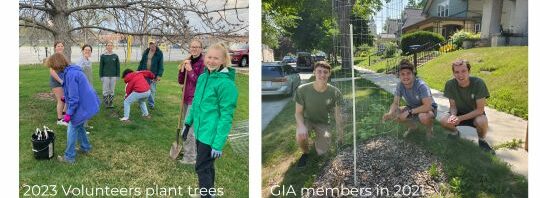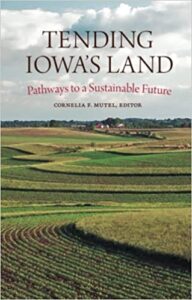WED Plants Shade Trees
Luke Frederick, GIA Audit Coordinator
On April 15, the Winneshiek Energy District was joined by a collection of eager volunteers to plant tree saplings. Every year, the Winneshiek Energy District, in collaboration with Kevin and Leslie Sand, hosts a tree planting event for residents in the Decorah area. By signing up, a resident can qualify for several species of free trees and the team will plant the trees for them. The tree species we offered this year were swamp white oak, hackberry, and kentucky coffee. So far, we’ve planted 19 trees and are waiting for approval to plant a few more.
The Winneshiek Energy District first began discussing a tree planting event in late February. We drafted a press release, the sign up form, and flier and the GIA team was introduced to Kevin Sand who received saplings from the State Forestry Nursery. On the 20th, we were ready to start accepting clients. The press release was posted on Decorah Now. For a week, we watched the number of requests trickle in. Then, over the weekend, the requests were piling in fast. Too fast. We gathered so many requests that we feared we’d be overwhelmed. We closed the form on the 31st of March and ended up with 19 responses and over 30 trees to plant.
The next day, we began to site the trees. Unfortunately, not everyone had an appropriate planting space, so our total number of trees dwindled until we reached 24. After siting, we arranged for the Iowa One Call to visit each property and check the gas, water, and electrical lines. We then got a hold of Sam Hogensen, the Decorah City Forester, and asked him about the rules for planting trees on the boulevard. He said we needed approval so we let the homeowners fill out the form.
We gathered at Kevin’s shop at 7:30 in the morning on the 15th of April. It was a cool, cloudy day with a high chance for rain. We took inventory, assigned teams, and planned routes. At 8:30, a loud crack of thunder resounded in the sky and the rain fell. The thunder was the starting pistol and the race to beat the rain was on. We gathered into our assigned trucks and headed in our separate ways.
Without Kevin Sand, this event would not have been possible. Kevin is a tree planting enthusiast, who once more lent us his knowledge, time, and resources so that we could plant free trees for residents in the Decorah area. He taught the current GIA team and many volunteers how to site, dig, and plant a tree to maximize the numerous benefits it can provide and as well to care for it as it matures. His motto, “Plant until you’re planted” resonates deeply as the trees we all assisted in planting will be enjoyed by generations long after our time.
We’d also like to thank the many volunteers who took part in the planting. Without them, the Winneshiek Energy District would not have been able to plant as many trees this year and as efficiently.



 In her chapter, Beth Lynch examines the value of biodiversity as an introduction to the fourth section of the book: Life. Lynch describes what biodiversity is, why it is important and the loss of biodiversity in Iowa since the mid-19th century.
In her chapter, Beth Lynch examines the value of biodiversity as an introduction to the fourth section of the book: Life. Lynch describes what biodiversity is, why it is important and the loss of biodiversity in Iowa since the mid-19th century.